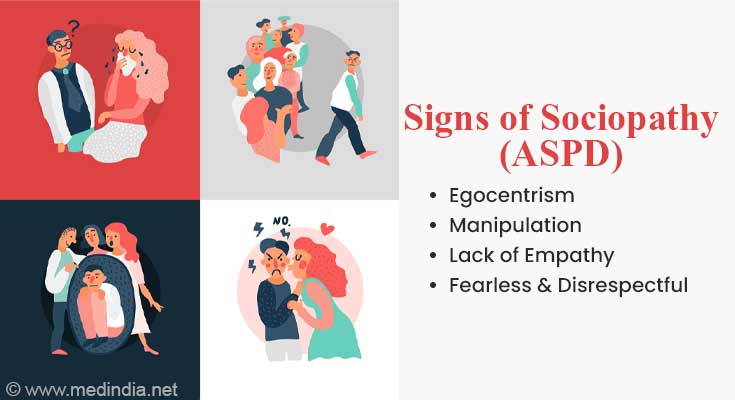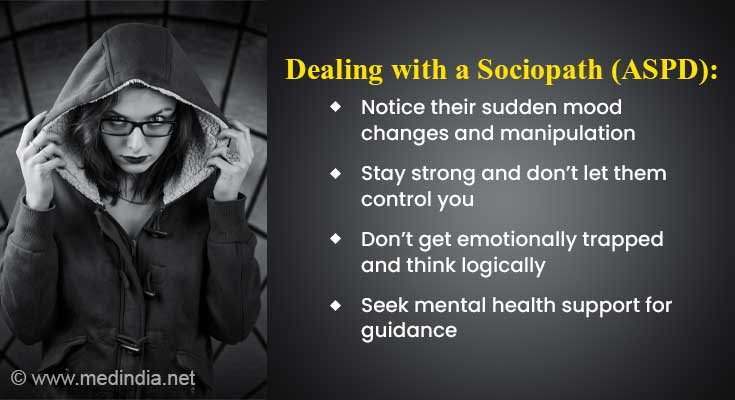- How to Recognize Signs of Sociopathy - (https://health.clevelandclinic.org/sociopath-personality-disorder)
About
Sociopathy is an antisocial personality disorder and a sociopath is a person who lacks empathy and is manipulative. Sociopaths seem to be charismatic and charming but they are deceptive, exploitative, and aggressive.
Not all sociopaths show the same symptoms and it is important to know the signs of a sociopath. One can encounter such people at work, in dating apps, or their family.
Did You Know?
About 3.6% of the U.S. population has antisocial personality disorder (ASPD). #sociopath #mentaldisorder #depression #medindia
What is Sociopathy?
A sociopath enjoys taking risks for their needs and disregards social norms and feelings of other people. They lack loyalty and do not feel guilty for their actions. Antisocial personality disorder (ASPD) is a mental health condition where a person manipulates and violates the rights of others without remorse.
It has been estimated that about 3.6% of the U.S. population has ASPD. To confirm a person with ASPD, they must show signs of conduct disorder before age 15 with symptoms like aggression, cruelty to people or animals, violating the norms, lying, and destroying property.
Signs and Causes of Sociopathy
The exact cause of the disorder is still unknown, but some hypothesis says that genetics or other factors like child abuse might be a reason. A person called a “sociopath” has to be diagnosed with ASPD and have a long history of aggression. However, some can have sociopathic behavior without any of these symptoms.
Some of the signs that you are dealing with a sociopath are(1✔ ✔Trusted Source
How to Recognize Signs of Sociopathy
Go to source):
- Egocentrism: Sociopaths are more egocentric and are only concerned about their needs than their family, children, or friends. They are selfish and manipulate anything for their gain. They don’t care about the society or others. While everyone must have been selfish at some point in their lives, this is a rule for sociopaths rather than an exception.
- Callousness: People with ASPD don’t spend time worrying and don’t care about their actions. This lack of concern can make them rude or insult others, and become physically aggressive. However, not all ASPD patients show this symptom.
- Manipulation: These people lie often and use people to get out of trouble to protect themselves. They also manipulate to enjoy their power over the other.
- Lack of empathy: Sociopaths don’t feel empathy for other people and this makes it difficult for them to maintain any kind of relationship. Sociopaths tend to be loners and view people as objects for their gain or to be avoided.
- Impulsivity: ASPD patients tend to risk things without any forethought. They do not think about the consequences and are sensation seekers.
- Fearless and disrespectful: People with ASPD don’t even fear engaging in criminal activity as there is no stopping mechanism. They disrespect others physically and emotionally. They do not accept their mistakes and tend to have an abusive or bad relationship.
- Lacks Remorse: They do not take responsibility for their actions. They even blame someone for being too weak and sensitive and justify hurting someone as they deserve it.

Sociopathy: Can Therapy Help?
It is difficult to diagnose and treat sociopaths. However, improving mood, and reducing anxiety and impulsivity with medication and therapy can reduce a few symptoms. It can also help them have empathy in some cases.
Sociopaths generally don’t recognize their behavior as abnormal and try to blame their environment for their problems. They can become more self-aware with treatments, but it depends on them for a complete change.
People with antisocial personality disorder do not take treatment for their condition but try to get therapies for anxiety and depression. While taking these therapies, their antisocial symptoms are identified.

Can Sociopaths Live a Normal Life?
Sociopaths can live a normal life if they are capable of controlling their impulsive behaviors. People with ASPD have stable jobs, maintain relationships, and integrate into society by using charm and manipulation. They even succeed in business, law, or politics, where their confidence and lack of emotional attachment can be an advantage. However, their inability to form emotional bonds can make personal relationships difficult, leading to conflicts and betrayals.
Some learn to adapt their behavior to avoid consequences, allowing them to function in society, while others struggle with legal issues, unstable careers, or broken relationships. Ultimately, their ability to lead a "normal" life depends on self-awareness, external support, and their willingness to modify harmful behaviors.

How to Deal with a Sociopath
One can find a sociopath with how their behavior changes drastically. They might seem charming and fun to be with but show sudden impulsive behavior leaving people confused. It might be difficult to accept the hurt and get stuck in a cycle of manipulation.
It is important to deal carefully with an ASPD as they know your vulnerabilities and know how to manipulate using it. Being with a sociopath continuously can make you confused, depressive, anxious, and have low self-esteem. Getting mental health assistance can help you to identify and tackle the problem.









